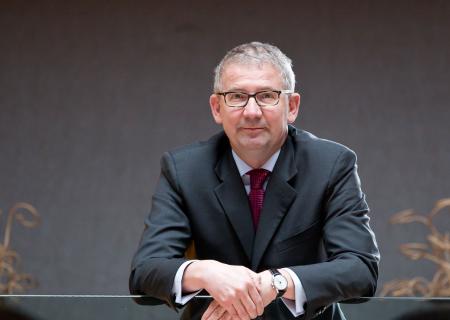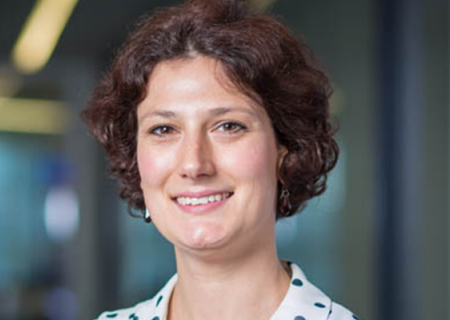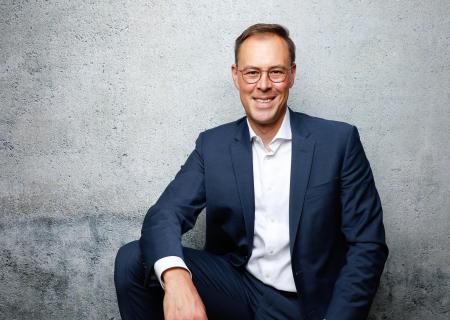Jon Gray
Global Head of Real Estate at Blackstone
With $93bn of investor capital under management Blackstone has enjoyed a meteoric rise to become the largest real estate private equity firm in the world. IQ spoke to Jon Gray, the firm’s charismatic Global Head of Real Estate on his flying visit to the INREV Annual Conference and discovered some of the secret of Blackstone’s success.
In Barcelona for little more than 24 hours, Jon Gray explained how he was due to visit Washington DC, London and Paris all in the space of just over a week. This would be a punishing schedule by anybody’s standards, but it’s made all the more remarkable for the fact that it appears to be the normal pattern of work. It might seem obvious that to establish the scale and success that Blackstone real estate has achieved globally, would necessitate a considerable amount of time on aeroplanes and in hotels; but for the man leading the charge, this is probably only possible because, as he admits, ‘I really love what I do.’ And there is no doubt that, alongside his vision and determination, passion is a major motivating factor.
Delivering returns
It’s a sentiment that seems to permeate every element of the way Gray describes his business, from the ‘buy it, fix it, sell it’ mantra, to the approach to maintaining standards and sharing information at a global level and, perhaps most importantly, the focus on delivering outperformance and returns for investors.
On this point, there is an almost evangelical tone: ‘The big question we’re often asked is how did our business get to be so large? There’s no mystery: it’s all about generating great returns for your investors. If you do a really good job, if you’re able to take advantage of market opportunities, take risk when you think it’s appropriate, sell when you think it’s appropriate, move quickly and deliver great returns over a long period of time capital tends to flow to you and that’s what’s happened to our business.’
With this emphasis, it’s perhaps unsurprising that Blackstone has consistently delivered a strong investment performance with annual global net returns to investors of 18% over 23 years. One of the reasons for this – and a recurring theme for Gray – is the rigorous focus on creating a single, integrated, global business as opposed to ‘a series of little franchises – lemonade stands all over the world’. Gray makes the point that there is a very good reason for managing the business on this basis: ‘Our investors look at us as one firm and they want the same standard of care no matter where they give us the capital.’
But before returns can be generated it’s all about where the investments are made. The business is built around the non-listed real estate funds sector in which Jon perceives major advantages for investors. In his view it is hard to access sufficient levels of real estate exposure just through the public markets – especially for large institutional investors.
‘The public markets tend to have more core-like assets that are more stabilised and accessing some of the outsize returns we produce is harder in these markets. A lot of sectors are not well represented either, particularly in Europe, so for institutions that want exposure to real estate, I think the unlisted sector is vital.’
Challenging the consensus
Blackstone’s strategy of investing in distressed products, and/or markets that have been out of favour, has been a masterstroke. It is clearly not an approach that would suit everyone, but moving against the consensus is one of the key principles that underpins the firm’s investment strategy.
Where many other market participants would take comfort from doing what their peers are doing, the ‘more exciting’ path for Blackstone has been to move into areas that others have avoided. Gray cites two examples: the firm’s acquisition of a half interest in Broadgate when the London property market had gone down by 40% in 2009, and the decision to buy US single family homes in 2011 when the rest of the market perceived US single family homes to have no future.
Real estate, he says, is a consensus-driven business. The important thing though is to have independence of thought, a willingness to ‘look at the world in a different way’ as this is what can generate differentiated returns.
It’s a lonely business and people will often say that what you’re doing is crazy and doesn’t make sense. I think you just have to have a willingness to do it. It doesn’t mean you’re always right.
Gray adds: ‘It’s a lonely business and people will often say that what you’re doing is crazy and doesn’t make sense. I think you just have to have a willingness to do it. It doesn’t mean you’re always right. We make mistakes just like everybody else but I think that willingness to challenge conventional wisdom is absolutely critical as an investor.’
Dream theme
In practical terms, this translates into specific markets, deliberate ‘themes’ and a keen sense of timing.
China, Brazil and the less obvious parts of Southern Europe, such as Italy, are geographies that Gray identifies as opportunities. In all three cases, the attraction is that they have recently suffered, or are currently faced with, at least one of several seemingly unfavourable circumstances: dislocation, currency falls, rising yields or general investor negativity. ‘We’re always looking for places where people are more fearful and less enthusiastic because pricing tends to be better in those places,’ says Gray.
However, there are clearly limits to the level of distress in a market the firm is willing to embrace. Africa, some of the smaller Latin American countries and parts of Eastern Europe, are still some way off presenting attractive opportunities. The lack of income-producing real estate, plus the obvious challenges around the rule of law, property rights and liquidity, mean these sorts of locations remain a stretch too far – at least for the time being. ‘We would rather have somebody else spend years and years developing something and then potentially have a need for new capital to come in.’
Thematically, the principle is to find a theme in which the firm believes, invest in a strong management team and create a workable platform. Gray highlights urbanisation and the impact of technology as major influences that will continue to guide investment strategies.
He identifies better returns continuing to flow from the major urban centres around the world, with the larger cities, such as London and New York, leading the way.
Likewise, the rise of the internet and ecommerce have increased the firm’s confidence in logistics on a global basis. They jumped into the sector with the highly successful creation of IndCor Properties in the US which was sold to GIC for $8.1 billion in 2014 – and Logicor in Europe. They have also established partnerships with major players in the sector in China and Japan.
Gray also references the firm’s exposure to Indian offices – a market that Blackstone entered in 2011 buying at yields of around 11% to 12% – before reeling off several other interesting, but much less frequently talked about, markets such as US select service hotels; well located secondary offices in Australia; and Japanese residential. And it always comes back to the firm’s ultimate goal: ‘Wherever we see something where we think that we can generate an outsize return and we can establish a team to exploit that opportunity we try to take advantage of it.’
Listening and learning
From the outside one might be forgiven for assuming that the ball always bounces right for Blackstone. However, it’s clear that there is absolutely no complacency. As Gray is quick to stress: ‘Success in the investment business can be fleeting. You’ve got to constantly be challenging yourself and saying ‘that was a good investment theme two or three years ago but now it’s a much more crowded trade so how am I staying ahead of the game, how am I looking at the world differently?’
This, says Gray, is the value of industry forums such as INREV. Singling out the Annual Conference, he concludes: ‘That’s why this sort of conference makes a lot of sense because you’re around a lot of other people who are thinking about property on a global basis and on a pan-European basis. You can learn something that can influence how you allocate that next dollar of capital.’







